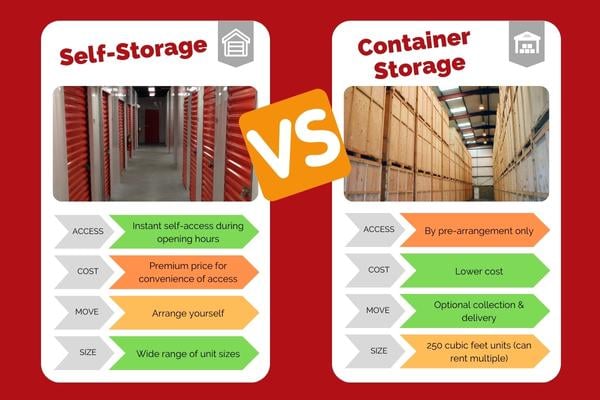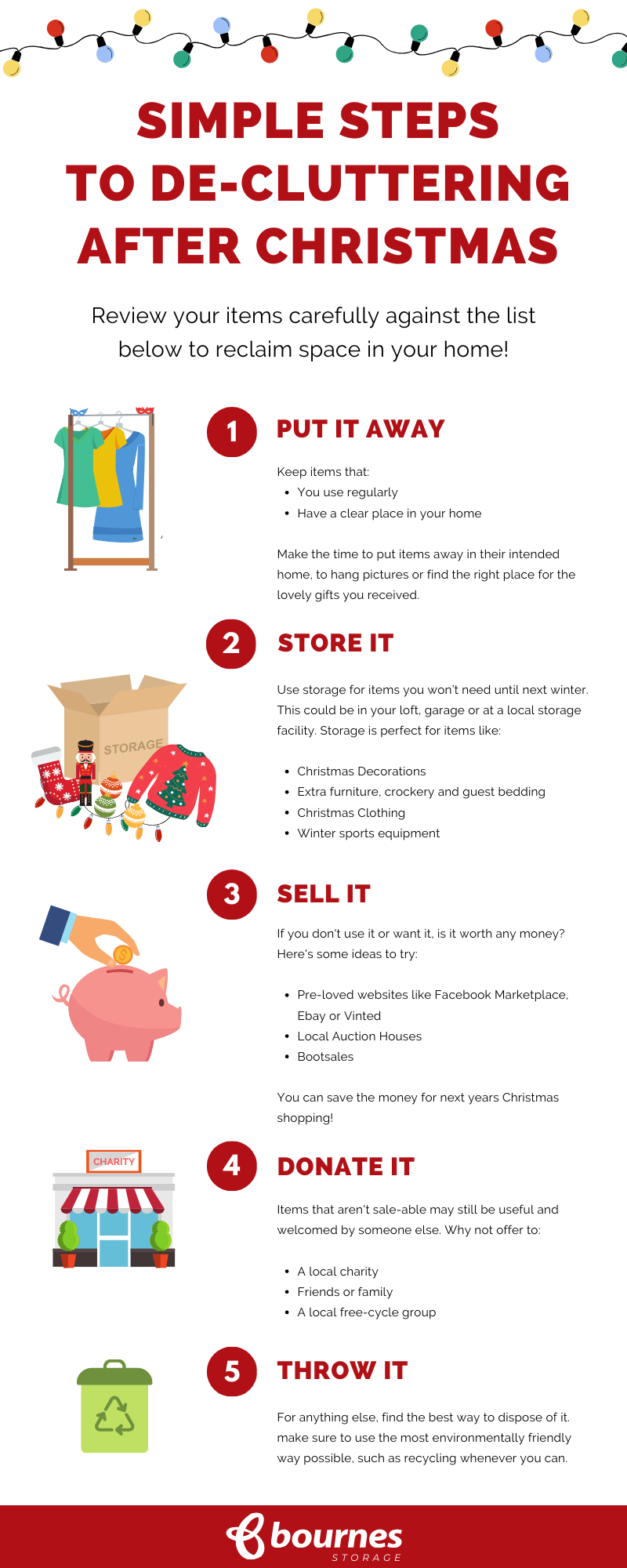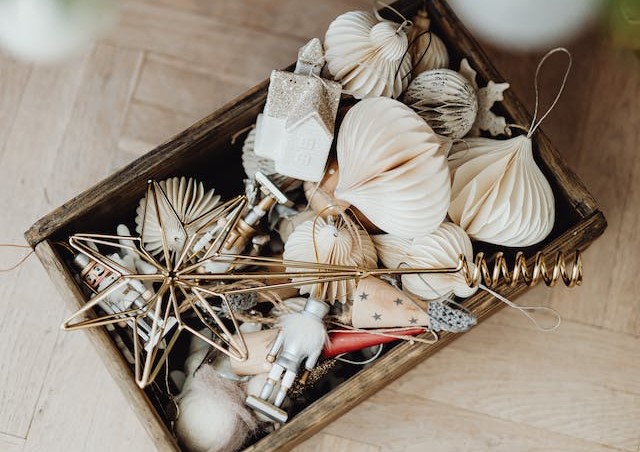Hopefully you've had a joyful festive season, filled with laughter and togetherness - but also, probably, an abundance of 'stuff'! From all the lovely gifts received to used wrapping paper and packaging, Christmas decorations that still need to be taken down and the extra furniture bought out to accommodate visiting guests.
Decluttering after Christmas can help give you more space and reduce your stress as well as helping others at a difficult time of year by donating or selling unwanted items.
This guide aims to help you declutter after the holidays and find storage solutions for those items you only need once a year. We hope it helps you create a more organised and stress-free living space for the new year whilst ensuring your holiday items are safely stored for next year.
Decluttering after christmas
Post Christmas Decluttering Essentials:
1. Start Early
If you've got a little time off work between Christmas and New Year this is the perfect time to start tackling the decluttering process. Set aside a bit of time each day to sorting items before the festive spirit wears off!
2. Purge Strategically
It may take longer, but take a few minutes to carefully evaluate each item before throwing straight in the bin. You may be able to reuse, recycle, donate or even sell items you don't want.
3. Utilise Storage Facilities
For items that you want to keep for next year, or may only need a few times a year, consider renting storage space. This can either be a self storage facility that you load and access yourself, or you can arrange storage with collection and delivery. This type of 'container storage' can often be more cost-effective than hiring a self-storage room if you don't need regular instant access - which makes it ideal for Christmas Decorations and extra furniture for guests.
Tips for sorting your seasonal items
Follow our step by step guide to de-clutter after Christmas (click the image to enlarge).
1. Items you want to keep
Items that you use regularly, have a clear place and use in your home or have sentimental value for keeping. Find homes for any new gifts you've received so that they will be well used and make sure anything else that has been displaced over the holidays goes back to it's normal home.
If you've received pictures. decorative items or artwork for Christmas make the time to hang and display them so you can enjoy them.
2. Items you won't need for a while
Christmas decorations, furniture and crockery you only really need when you have extra guests visiting and Christmas Clothing can be stored away for next year.
If you have space in your loft, garage or other home storage space you can use this, or you can rent local storage space to free up space at home.
If you're frugal by nature or keen to make next Christmas a little more sustainable you can store un-damaged wrapping paper, gift bags or boxes to re-use again next year. You could even store your Christmas Cards to upcycle into next year's gift tags.
3. Items you don't want that have some value
There is a huge secondhand / pre-loved market for many household items, clothes and toys. Not only is this good for the environment but means you can make a bit of cash for next years Christmas shopping too!
Websites like Facebook Marketplace, Vinted and Ebay are some of the most common pre-loved marketplaces and are easy to use. Make sure to photograph your items well (e.g., iron any clothes and use an uncluttered background) and give a clear description giving as much information as you can, including any notes on wear and tear.
For furniture or specialist items with higher value a local auction house may be able to get you the best price and buyers (for a small commission).
And everyone loves a bootfair! (OK, not everyone, but if that's you - go for it!)
4. Items you can't (or don't want to) sell
If you don't fancy the idea of selling your items they may be very much welcomed by someone you know, a local charity or someone in your community.
There are many Facebook and other websites for 'free-cycling' e.g., offering items for free. Again, take pictures and get them posted to make arrangements directly with someone in need.
5. Items for disposal
For the items that just need to be thrown away try to do this in the most environmentally friendly way possible, recycling wherever possible. If you are having items collected by a waste collection company make sure to check they are licenced - you don't want to run the risk of rogue traders 'fly-tipping' your items (which is really bad for the environment, and you could be held legally responsible!).
Tips for storing seasonal items
1. Pack and Protect Carefully
Make sure items are clean and dry and seal in water-tight containers if you can to prevent damage during storage.
Loft spaces and outbuildings can be cold and damp and items can become mouldy or ruined if not properly protected. Plastic storage tubs with clip-on lids are a great solution that can be re-used year after year.
If you're storing in a location that may be at risk of rodents or birds then plastic storage containers are safer than cardboard or bin bags. You should also avoid anything that is attractive to these creatures - e.g., nest making materials or dried food/plant material.
2. Label
If you can't clearly see what items are within a box then label clearly and in detail so you can quickly identify and retrieve items when you need them.
3. Keep an Inventory
If you're storing items at a local storage facility away from your home then keep a detailed list of what is stored so that you can quickly locate items if you need to. If you're using storage with a collection service then the company collecting the items may produce this for you when they load everything.
4. Find the best value storage facility for your needs
Self-storage rooms are popular in many larger towns, and their 24/7 instant access is attractive, however, they may not be the most cost-effective solution.
If you don't need regular access to your items then wooden container storage (typically offered by removal companies) with a collection and delivery service can be cheaper.

Making de-cluttering more manageable and even fun!
If you're not someone who loves a big sort out then the thought of decluttering might be your worst nightmare. Here are a few tips to make it easier and maybe even fun!
- Break the house down into areas and tackle one at a time.
- Give yourself a timer challenge and sort as much as you can within short manageable chunks.
- Involve the family by making it a game.
- Take before and after photos so you can celebrate your progress.
- Play music that makes you happy
- Invite friends over to help, you can even turn it into a donation or swap party!
However you tackle your Christmas declutter this season, good luck!

.png)












